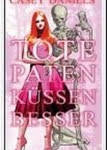By: C.J. Henderson
The Luddites, to make a short and inadequate explanation of a much more complicated movement, were folks who were against mechanical advancement. Worrying over the grim reality of losing jobs to automation goes back to the Industrial Revolution. These guys actually committed some pretty serious crimes to get their point across. They were rounded up and their riots quelled in the end, but they did raise an interesting point–
How much progress is enough?
Now, this is not one of those lectures on getting your kids to go outside to play more. You should do that, but you know, that’s up to you and your kids. No, this is a rant aimed at people who are perfectly willing to allow machines to replace parts of themselves which those machines are not fit to replace. Huh, I hear you mutter. I shall explain.
Automobiles … perfectly reasonable to drive them to a convention in another state. To the supermarket when you need to bring back 287 pounds of vittles. To the movie theater when you have to take four kids and it’s raining. There are a thousand, a million good reasons you can come up with for not walking. But, do we sometimes go too far?
For instance, have you ever gotten into the car and driven to a place only ten blocks away? Simply to mail a letter, or pick up a box of light bulbs?
In other words, when does the convenience become a burden? A certain amount of exercise is needed. Taking into consideration the trouble finding parking some times, the expense of gasoline, such a trip can end up taking more time and costing far more than it’s worth. But, in this modern world this ceases to be a consideration. Driving is what one does often …
Rather than thinking.
Then, add a cell phone.
How did people survive before them? Are you old enough to remember the world before cell phones? Did you find it impossible to communicate then? Probably not. But, along they came, and everyone suddenly had to have one. And had to chatter every minute of the day. Did they suddenly have so many more wonderfully interesting things to talk about?
No.
You know damn well they didn’t. Neither did you. But people can’t seem to put them down. They waste hours every day, chatting, and now texting, with absolutely nothing to say. Simply because a machine was put into their hands.
And, worse yet, so many of the grinning apes all around us think they have the skills to use automobiles and cell phones together. They think … now read this slowly and consider the lunacy of it while you do … that they have the skills to type while they drive.
To type while they drive.
Most of them can’t drive very well to begin with, don’t use turn signals, don’t know which lane to be in at what speeds, don’t understand the dangers of passing on the right (or forcing others to pass them on the right), et cetera. And, most of them can’t type very well, either.
Two great tastes that don’t go great together.
You’ve seen the videos of morons walking along texting tripping into fountains, falling down stairs, slamming into signposts, et cetera. And yet, these people believe they can drive cars while they type, when they can’t even walk and type at the same time.
The availability of technology does not imply mastery of it.
Am I getting through to anyone?
Who knows? Why would I ask that? I’ll tell you.
I ask such a question to make the reader wonder, if only for a split second about the question. I’m challenging you to consider what you have read before I go on to the major point. A point, oddly enough, of lesser consequence than the set-up.
Yes, I believe the above to be a major problem, and I will curse to Hell the mush-brained jackass that rams into me at 65 miles an hour because they were too busy letting some other worthless waste of oxygen know how much they “heart” some band or pictures of Internet cats or whathaveyou. But, the idea presented above was there to focus your minds on a smaller but, for we who write and edit and read for pleasure, in some ways equally disastrous set of problems.
Spell check. Let’s start there.
Spell check (and its equally evil twin, grammar check), may not be worth the problems it has caused.
Now initially, a great idea. Time saving. Super. Bring it on.
When I first encountered this technology, I was delighted. A traditionally bad speller (dictionary always on hand for this writer), it was a blessing sent from God. Indeed, as I would go through a ms. Checking each word it questioned, over the years I found myself actually becoming a better speller because I had this patient teacher willing to take me by the hand, word by word, and quietly explain each mistake to me.
It was wonderful.
But, most people don’t seem to have taken my approach. Most people seem content to simply let the machine correct things they way it wishes to do so … whether it’s right or not. They listen to their grammar checker and do whatever it says, abandoning what creativity they might have had in favor of a machine’s limited ability to structure a sentence.
Worse yet, we now have spell checkers being imposed on us.
Try typing the phrase “sci fi” in an email. At AOL, the machine will not let you leave “fi,” but will automatically change it to “if.” Because it knows better. Because you’re too stupid to be allowed to type what you want.
And, in a world where so many people are too stupid to be allowed to type what they want, can we blame the machines for rising up and trying to kill John Connor before he has us all filling our letters with goddamned idiotic “:O(” crap? What kind of pinhead uses this nonsense to convey a feeling?
The kind that has been brainwashed into believing they have no creativity. That conformity and speed equal something better than free expression.
Technology is a wonderful thing. It truly is. When I was a child I hand wrote stories. Hundreds of them. Then I learned to type. It was a glorious release. Then, the electric typewriter was born, and a golden age seemed to have arrived.
And then, the word processor was sent down from the mountain, and God had proved he loved his people.
No, I don’t want a return to the quill pen. But, when I get a new book delivered from a publisher, and I find that all they did was plug my ms. into a lay-out program which leaves my book ugly, boring, pedestrian and worse, filled with hundreds of technical mistakes … then suddenly I’m ready to start talking behind HAL’s back while hoping it can’t read my lips.
I just spoke with another author today who told me their new book arrived from a publisher who did the same thing, used a program to do the lay out for their book, but then didn’t bother to look at the results. Their book actually was printed and sent to the stores with strike overs in the text.
Sure it’s cheaper to not hire an editor, simpler to let the machine do the work, faster to not go through the effort of reading every single line for the tenth time, looking for dropped lines and extra spaces and run overs and strike overs and misplaced words and …
Well, you either get the idea, or you don’t.
What I’m trying to say is, don’t remove the human element from your work. When you type something, whether it’s a novel, or just a reminder to a friend as to where and when you are to meet, do it with care. Read over what you’ve written. Think about it. Decide as to whether or not it could be better.
Quantity … or quality?
Is it better to type up 500 meaningless, pointless texts a day, empty messages which will be forgotten instantly …
Instantly?
Or five or six texts which come from your soul, which tell those to whom they are sent something important, something vital, something lovely?
Spell check–good.
Caring enough to read it over after spell check–better.
Caring enough to re-write, and to think about what you’ve written, to actually explore your feelings and the depths of your soul, opening yourself to the world beyond, taking a chance on your ability to express yourself …
Yeah, it’s dangerous. But it has it’s rewards.













